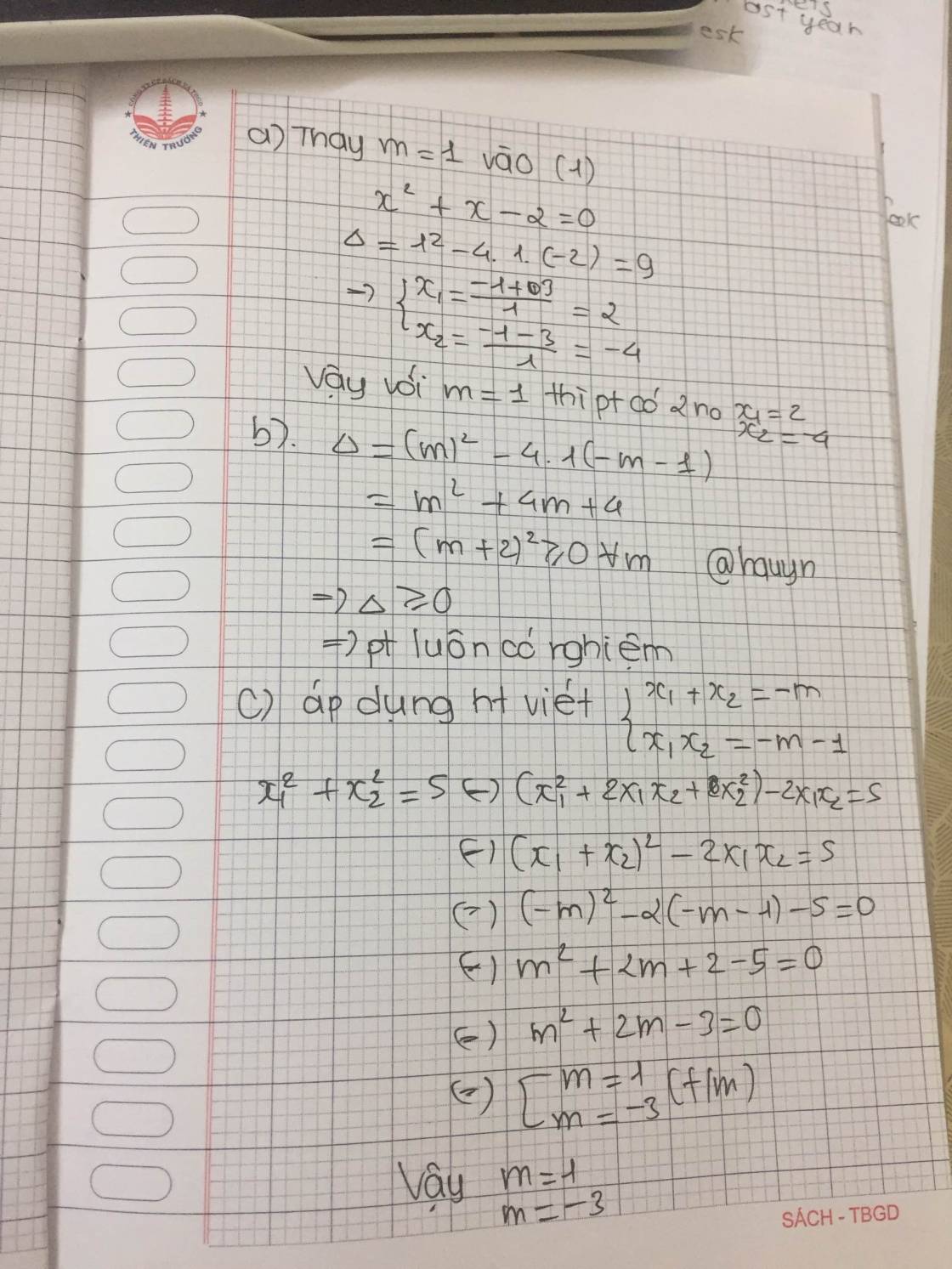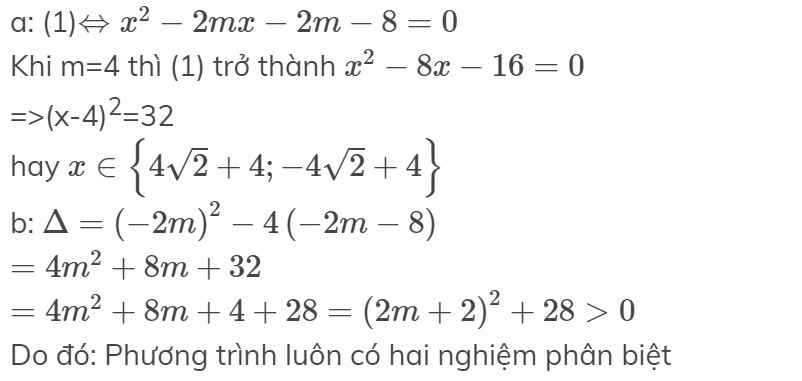Hãy nhập câu hỏi của bạn vào đây, nếu là tài khoản VIP, bạn sẽ được ưu tiên trả lời.

Bài 1:
a) Thay m=3 vào (1), ta được:
\(x^2-4x+3=0\)
a=1; b=-4; c=3
Vì a+b+c=0 nên phương trình có hai nghiệm phân biệt là:
\(x_1=1;x_2=\dfrac{c}{a}=\dfrac{3}{1}=3\)
Bài 2:
a) Thay m=0 vào (2), ta được:
\(x^2-2x+1=0\)
\(\Leftrightarrow\left(x-1\right)^2=0\)
hay x=1

a: Khim=0 thì (1) trở thành \(x^2-2=0\)
hay \(x\in\left\{\sqrt{2};-\sqrt{2}\right\}\)
Khi m=1 thì (1) trở thành \(x^2-2x=0\)
=>x=0 hoặc x=2
b: \(\text{Δ}=\left(-2m\right)^2-4\left(2m-2\right)\)
\(=4m^2-8m+8=4\left(m-1\right)^2>=0\)
Do đó: Phương trình luôn có hai nghiệm

1.Ta có \(\Delta=4m^2-4\left(m^2-m-3\right)=4m+12\)
Để phương trình có 2 nghiệm phân biệt \(\Rightarrow\Delta>0\Rightarrow4m+12>0\Rightarrow m>-3\)
Theo hệ thức Viet ta có \(\hept{\begin{cases}x_1+x_2=2m\\x_1.x_2=m^2-m-3\end{cases}}\)
a. Phương trình có 2 nghiệm trái dấu \(\Rightarrow x_1.x_2< 0\Rightarrow m^2-m-3< 0\Rightarrow\frac{1-\sqrt{13}}{2}< m< \frac{1+\sqrt{13}}{2}\)
Vậy \(\frac{1-\sqrt{13}}{2}< m< \frac{1+\sqrt{13}}{2}\)
b. Phương trình có 2 nghiệm phân biệt dương \(\Leftrightarrow\hept{\begin{cases}x_1+x_2=2m>0\\x_1.x_2=m^2-m-3>0\end{cases}\Leftrightarrow\hept{\begin{cases}m>0\\m< \frac{1-\sqrt{13}}{2}\end{cases}\left(l\right);\hept{\begin{cases}m>0\\m>\frac{1+\sqrt{13}}{2}\end{cases}\Leftrightarrow m>\frac{1+\sqrt{13}}{2}}}}\)
Vậy \(m>\frac{1+\sqrt{13}}{2}\)
2. a.Ta có \(\Delta=\left(2m-1\right)^2+4m=4m^2-4m+1+4m=4m^2+1\)
Ta thấy \(\Delta=4m^2+1>0\forall m\)
Vậy phương trình luôn có 2 nghiejm phân biệt với mọi m
b. Theo hệ thức Viet ta có \(\hept{\begin{cases}x_1+x_2=1-2m\\x_1.x_2=-m\end{cases}}\)
Để \(x_1-x_2=1\Leftrightarrow\left(x_1-x_2\right)^2=1\Leftrightarrow\left(x_1+x2\right)^2-4x_1x_2=1\)
\(\Leftrightarrow\left(1-2m\right)^2-4.\left(-m\right)=1\Leftrightarrow4m^2-4m+1+4m=1\)
\(\Leftrightarrow m^2=0\Leftrightarrow m=0\)
Vậy \(m=0\)thoă mãn yêu cầu bài toán

Viết lại đề : \(x^2-2mx+m^2-1=0\left(a=1;b=-2m;c=m^2-1\right)\)( 1 )
a, Thay m = 1 vào pt (1) ta đc
\(x^2-2.1x+1^2-1=0\Leftrightarrow x^2-2x=0\)
\(\Leftrightarrow x\left(x-2\right)=0\Leftrightarrow\orbr{\begin{cases}x=0\\x=2\end{cases}}\)
b, Để phương trình có 2 nghiệm phân biệt thì \(\Delta>0\)
Tương ứng vs : \(\left(2m\right)^2-4\left(m^2-1\right)=4m^2-4m^2+4=4>0\)(EZ>33)
c, Áp dụng hệ thức Vi et ta có : \(x_1+x_2=2m;x_1x_2=m^2-1\)
Theo bài ra ta có : \(x_1+x_2=12\)Thay vào ta đc
\(\Leftrightarrow2m=12\Leftrightarrow m=6\)

Bài 1:
$2x^4-3x^2-5=0$
$\Leftrightarrow (2x^4+2x^2)-(5x^2+5)=0$
$\Leftrightarrow 2x^2(x^2+1)-5(x^2+1)=0$
$\Leftrightarrow (x^2+1)(2x^2-5)=0$
$\Leftrightarrow 2x^2-5=0$ (do $x^2+1\geq 1>0$ với mọi $x\in\mathbb{R}$)
$\Leftrightarrow x^2=\frac{5}{2}$
$\Leftrightarrow x=\pm \sqrt{\frac{5}{2}}$
Bài 2:
a. Khi $m=1$ thì pt trở thành:
$x^2-6x+5=0$
$\Leftrightarrow (x^2-x)-(5x-5)=0$
$\Leftrightarrow x(x-1)-5(x-1)=0$
$\Leftrightarrow (x-1)(x-5)=0$
$\Leftrightarrow x-1=0$ hoặc $x-5=0$
$\Leftrightarrow x=1$ hoặc $x=5$
b.
Để pt có 2 nghiệm $x_1,x_2$ thì:
$\Delta=(m+5)^2-4(-m+6)\geq 0$
$\Leftrightarrow m^2+14m+1\geq 0(*)$
Áp dụng định lý Viet:
$x_1+x_2=m+5$
$x_1x_2=-m+6$
Khi đó:
$x_1^2x_2+x_1x_2^2=18$
$\Leftrightarrow x_1x_2(x_1+x_2)=18$
$\Leftrightarrow (m+5)(-m+6)=18$
$\Leftrightarrow -m^2+m+12=0$
$\Leftrightarrow m^2-m-12=0$
$\Leftrightarrow (m+3)(m-4)=0$
$\Leftrightarrow m=-3$ hoặc $m=4$
Thử lại vào $(*)$ thấy $m=4$ thỏa mãn.

a)Ta có:
`\Delta'`
`=(m+1)^2-6m+4`
`=m^2+2m+1-6m+4`
`=m^2-4m+5`
`=(m-2)^2+1>=1>0(AA m)`
`=>`phương trình (1) luôn có 2 nghiệm phân biệt với mọi m
Câu b đề không rõ :v

